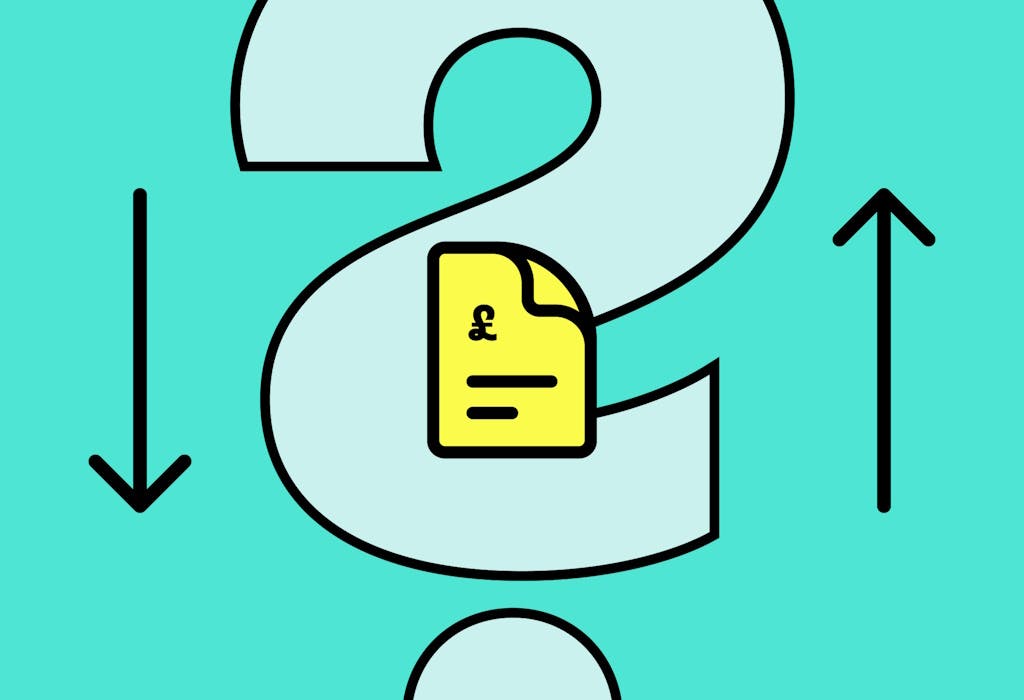Are energy prices going down?
Here's why the end of the energy crisis probably won’t mean an end to rising prices, and what you can do about it.
Written byJosh Jackman

Calculate savings
What kind of home do you live in?
Calculate savings
What kind of home do you live in?
Energy price forecasts: at a glance
📈 The energy price cap will rise by £111 in April 2025
⚡ Energy prices will stay high until the late 2030s, according to experts
💷 Reaching net zero will require more electricity, which will drive prices up
☀️ If we don't decarbonise our electricity, we'll be vulnerable to price hikes
Energy prices have risen massively over the past couple of years, and are expected to stay high for the rest of the 2020s.
The energy crisis has caused distress and hardship all over the country, with millions thrust into fuel poverty and countless households having to make painful cuts to get by.
In this guide, we’ll explain why the end of the energy crisis probably won’t mean an end to rising prices, the factors behind this trend, and what you can do to lessen its impact.
If you would like to see the savings you could get from a solar & battery system, click the button below. Just answer a few quick questions, and we’ll provide an estimate.
Find out how much you can save
What kind of home do you live in?
What’s happening to UK energy bills?
UK energy bills have fallen since the peak of the energy price crisis, but are on the rise again.
After lowering the price cap in July 2024, Ofgem raised it by 10% (£149) in October 2024, and then increased it by a further 1% (£21) for the January to March 2025 period.
And the price cap is going up again in April, jumping up by 6.4% (£111).
This means that, as of 1st April 2025, the average household will pay £1,849 for energy - 61% more than the £1,149 it paid in 2021. That's an extra £700 for the same service.
Energy costs are still well above their pre-2022 level, and seem unlikely to drop back down to the pre-2022 level for the foreseeable future, if ever.
Annual energy bill on the price cap, Jan 2024-Apr 2025
What is the price cap based on?
The price cap is the maximum amount that can be charged for each unit of gas and electricity used on a standard or default tariff by a dual-fuel household which pays with direct debit.
Ofgem calculates the price cap based on wholesale energy costs, network maintenance and development costs, government policy costs, suppliers’ operating costs, and VAT.
Rising wholesale costs were responsible for 77% of the April 2025 price cap increase, with government social and environmental schemes being the second most influential factor at 11%.
To learn more, check out our guide to the energy price cap.
Why will the price cap increase in April 2025?
The price cap will increase on 1st April 2025 because wholesale prices of energy rose in the months before Ofgem announced the new rates in February 2025.
This was down to a particularly cold, still winter across Europe, which led to unusually low levels of output from wind farms, and gas having to make up the shortfall. Gas flows from Russia to Europe via Ukraine were also suspended on 1st January.
As a result, natural gas reserves are very low across the continent (below 50% of capacity, as of 10th February), which has driven up the cost of gas. In fact, it's risen to its highest point in two years, at €58.75 per megawatt-hour (MWh).
The other cause of the price cap rising named by Ofgem is inflation, which is currently at 3.9% - its highest level since January 2024.
Energy Secretary Ed Miliband said: “The rise in energy bills, as a result of the global spike in gas prices, will be worrying news for families. As long as we remain exposed to fossil fuel markets, we’ll be stuck on the rollercoaster of prices.
The single most important thing we can do is stick to our clean power mission."
Long-term energy bill forecasts
Energy consultancy Cornwall Insight has forecasted that energy prices will remain high until the late 2030s.
It expects wholesale prices to fall in the short term, as renewable energy sources like wind and solar come to the fore.
However, the success of this green revolution will depend on government policy and the economy, both of which will affect the public’s enthusiasm for eco-friendly options.
And though price decreases are always welcome, household bills will still be well above pre-2022 levels, according to the consultancy.
The period of relative calm also won’t last long. The decline in costs is reportedly set to end at the end of the 2020s, as the UK’s expanding renewable capacity allows it to rapidly electrify its transport and heating sectors.
This transition is crucial for reaching net-zero emissions and reducing costs for customers in the very long term, as well as making the UK more self-sufficient when it comes to energy – but we don’t have enough storage to make it work as it should.
So when the sun isn’t shining and the wind isn’t blowing, instead of exclusively using the electricity we gained earlier from solar and wind farms, we’ll have to turn to gas to keep us going.
Some of our energy will also be sent to mainland Europe, as the continent struggles to fill the gaps left by France’s declining nuclear capacity.
If Europe also moved to create renewable energy capacity at a faster level, it would help us – but that doesn’t seem likely at the moment.
Beyond the end of the 2030s, there are too many variables to accurately predict how much electricity and gas will cost.
For instance, an event on the other side of the world could trigger a global shift in energy prices, which even analysts like Cornwall Insight understandably can't predict.

Why might energy bills increase in the long term?
Energy bills are likely to increase for a number of reasons:
- Increased demand for electricity
- More electricity exports
- LNG imports
- Ageing gas and nuclear facilities
- Delays to nuclear plants
- Inflation
Here’s some more detail on each of these factors.
1. Increased demand for electricity
To meet our legally binding target of net-zero emissions by 2050, the UK will have to replace much of its gas, oil, and petrol usage with electricity.
As the popularity of electric vehicles and heat pumps surges, we’ll end up increasing our electricity consumption by 50% between 2020 and 2035, according to the Climate Change Committee.
We’ll also have to increasingly derive our electricity from renewable sources like solar, wind, and hydropower.
This shift will lower energy prices eventually, but not for a few decades at least. Much of the cost of building up our renewable capacity – not to mention expanding the electricity grid – will be placed on customers.
Gas will inevitably be required throughout this rapid process of electrification, as we rush to create the storage needed to keep providing us with electricity during periods with low amounts of wind and sun.
So it’s not ideal that gas prices are predicted to stay high until 2050, according to the UK government.
One of the best ways of avoiding these higher energy costs is to get solar panels. If you’re interested in how much you could save with a solar & battery system, enter a few details below and we’ll generate a quick estimate.
Find out how much you can save
What kind of home do you live in?
2. More electricity exports
Over the next decade or two, UK companies will export more of their electricity to Europe, particularly as France’s government-owned nuclear capacity continues to decline.
31 of the country’s 56 nuclear power plants have now run for 40 years or more, and though France’s national safety authority has permitted its older reactors to run for at least 50 years, they’re already showing their age.
The country’s 56 nuclear plants – of which only 46 are currently online – produced 23% less electricity in 2022 than in 2021.
This represented a dramatic fall from 361TWh to 279TWh, and though France’s nuclear output bounced back to 320TWh in 2023 and exceeded this figure in 2024, the overall downward trend is clear.
EDF’s production levels are declining, and the high of 393TWh in 2018 is likely to be a distant dream in the near future.
As France is gradually less able to provide the rest of Europe with electricity, UK suppliers will step in to replace these nuclear plants.
This reduction in the amount of available electricity in the UK – and across Europe – will cause prices to rise.
3. LNG imports
The UK imports a significant amount of LNG to power its electricity generation – though this figure is rapidly decreasing.
We imported more than 210,000GWh of LNG in 2023, which was 42% of our total gas imports. But our LNG imports fell by 53.2% from January to November of 2024, compared to the same period in 2023.
If this trend continued during December 2024 (data not yet available), the UK will have imported around 97,825GWh of LNG across the year, which is still a substantial amount, despite the huge reduction.
Considering gas generated 26% of the electricity used in the UK in 2024, LNG fulfils a large portion of our needs – and this leaves us vulnerable.
81% of our LNG imports from January to November 2024 came from the US, Qatar, and Peru. Geopolitical turbulence in any of these countries could significantly reduce our supply of electricity, with little to no warning.
Any fall in our supply levels will lead to a rise in household energy bills. If the drop is sudden, as it often is when geopolitical relations break down, this will leave little time to find new sources of energy, resulting in a higher price increase for customers.
4. Ageing gas and nuclear facilities
The UK will need to generate electricity with gas and nuclear energy for the next couple of decades at least, to fill the gaps in our supply while we build up our renewable and storage capacity.
However, many of the country’s gas and nuclear power plants are deteriorating and will see their productive capacity decline before being shut down in the near future.
Half of the UK's 32 gas plants will reach the end of their typical 30-year lifespan by 2030, as well as four of the country's five nuclear power stations.
Sizewell C is the only nuclear plant likely to open by 2035, and though its 3.2-gigawatt capacity is large, it won't even make up for all the nuclear capacity lost by that point.
The UK may then end up building new gas plants, which will leave customers paying more, for multiple reasons.
The plants will likely cost billions of pounds, which will directly lead to household energy bills increasing. Our continued reliance on gas will also leave consumers open to global gas price rises, which was the whole reason why the energy crisis hit the UK so hard.
On the other hand, if the government ultimately decides not to build new gas plants – in line with the country's legal obligation to cut its carbon emissions by 78% by 2035 – the UK’s supply of electricity may not be able to keep up with its growing demand.
This would also raise electricity prices.
5. Delays to nuclear plants
Sizewell C, a nuclear plant first proposed in 2012, will not be completed by the mid-2030s at the earliest, and Hinkley Point C's commission date has been delayed until some time between 2029 and 2031.
When combined with all the nuclear and gas plants set to close by 2030, this has created a situation in which grid supply costs will stay high until the end of the decade and probably beyond, according to Cornwall Insight.
This will largely be driven by backup power suppliers who guarantee to fill in any gaps in the electricity supply over a certain period.
They bid for these government contracts in twice-annual auctions that apply to periods around four years in the future – and Cornwall Insight has forecast that the rate will jump from its current £18 per kilowatt (kW) to £51 per kW for 2024-25, then rise again to £65 per kW for 2027-28.
This will again have an unwanted impact on energy bills.
6. Inflation
From 2000 to 2020, the price of electricity went up by 5.5% per year, on average, according to the Office for National Statistics (ONS).
Inflation was the main reason for this rise, rather than any variations in wholesale prices. So even if wholesale prices fall, the cost of energy will still probably go up.
Now the worst of the energy crisis is over and prices have stabilised at around £400-£500 more per year than before, we’ll likely return to seeing 5.5% of annual inflation growth, on average.

How to protect yourself against energy bill increases
There are a few ways to protect yourself against energy bill increases.
You should focus on cutting the amount of energy you use, securing low fixed prices if possible, and producing energy with renewable technology like solar panels.
- Switch to solar
- Insulate your property
- Fix your energy bills
- Use smart energy apps
1. Switch to solar
You can cut the amount of electricity you import from the grid by generating your own electricity instead - with solar panels.
You can also sell your excess solar electricity to the grid, for additional savings.
On average, you could save 86% on your electricity bills with a solar & battery system.
This figure is based on a sample of over 150 systems installed by Sunsave across England and Wales in 2024. The average system is 6.1kWp, with 54% of solar electricity used at home and 46% exported to the grid.
And if you’re planning on getting a heat pump or electric vehicle any time soon, getting solar panels can save you even more money.
The high upfront cost is a barrier to many households – but fortunately, Sunsave Plus allows you to enjoy all the benefits of solar with no upfront cost, and to instead pay a fixed monthly fee.
With Sunsave Plus, you’ll receive best-in-class kit in one easy package that comes with a 20-year Sunsave Guarantee. Your system will be insured by Aviva against damage, fire, and theft, and you’ll receive 24/7 monitoring and maintenance support.
You’ll also be reimbursed for extended downtime periods, and you’ll get a free replacement battery and inverter when they decline below a certain level. That means your installation will work seamlessly, look excellent, and save on your energy bills from day one.
2. Insulate your property
It’s always a good idea to insulate your home as effectively as possible, to cut the amount of energy required to fulfil your heating needs.
You can insulate your walls, loft, and roof, as well as ensuring every window is fitted with double glazing.
Making all these improvements can potentially save you hundreds of pounds per year – but the rate of return isn’t usually as good as it is with solar panels.
3. Fix your energy bills
You can fix your energy bills for the next year or two, which protects you against price rises in that period.
This is usually only a short-term solution – unless you choose Sunsave Plus.
With Sunsave Plus, your monthly payments are fixed for 20 years, meaning you’ll be protected against inflation and electricity price rises well into the 2040s.
What’s more, the amount you save every year will also grow over time, as the cost of grid electricity steadily increases over the decades.
4. Use smart energy apps
These are apps designed to help you understand, manage, and reduce your energy usage, such as Loop.
You can integrate them with your smart meter to give you a detailed view of your consumption, empowering you to make important changes at home.
They can’t cut your usage or energy bills by themselves, but if you absorb the information they provide, you can save a significant amount of money.
If you’re on a time of use tariff like Agile Octopus, you may not even have to reduce your consumption – just shift it.
Verified expertIf you don’t know how much energy you’re using, it’s hard to figure out how to cut back. That’s where free energy-saving apps like Loop come in handy. With Loop, you can track your energy use and costs so you can see where to make savings and avoid unexpectedly high bills. On average, Loop users reduce their energy use by 15%.
Dr. Steve Buckley
Energy Doctor and Head of Data Science at Loop
With a background in statistics and data science, Steve is in charge of product direction at Loop and has worked at multiple successful startups.
Summary
Energy bills are poised to continue rising in the medium and long term.
The cost of electricity increased by 5.5% between 2000 and 2020, and this rate may even be surpassed in the coming decades, as the UK attempts to electrify its heating and transport networks while simultaneously fulfilling increasing needs in the rest of Europe.
Our reliance on LNG and gas are also likely to lead to higher energy prices – but thankfully, there’s a solution.
Solar panels can slash the electricity you’ll need to buy from the grid, and allow you to make extra money by selling excess electricity.
If you’re interested in how much you could save with a solar & battery system, enter a few details below and we’ll generate a quick estimate.
Find out how much you can save
What kind of home do you live in?
FAQs
Will energy prices ever go down in the UK?
Energy prices will go down periodically, but in the long run, all signs point to them increasing.
Between 2000 and 2020, the cost of electricity increased by 5.5% per year on average, according to the Office for National Statistics (ONS).
There’s every reason to suspect this trend will continue now, or even that the cost of electricity will rise more quickly.
With the UK electrifying its heating and transport systems, demand for electricity is set to rise sharply, and our supply may well struggle to keep up with this level of growth.
Why is electricity so expensive in the UK?
Electricity is so expensive in the UK largely because it’s driven by the wholesale price of gas.
The two are so closely linked because the wholesale price of electricity is set by the cost of producing the last unit of electricity needed to meet demand.
And this last unit is almost always generated by a gas power plant.
If the government set the price in a different way, as many other countries have done, we would potentially pay much less for electricity.
Should I fix my energy bill now or wait?
You should fix your energy bill now if you can get a good deal, all other things being equal.
Energy bills will rise on 1st April when the new price cap comes into effect, with the average household set to pay £111 more each year for electricity and gas.
Make sure you get your new tariff sorted by then – but watch out for any exit fees.
Is it worth switching to Octopus Energy?
It’s worth switching to Octopus Energy if you can sign up to a generous tariff that suits your energy usage patterns.
Octopus regularly wins customer service awards and offers many attractive tariffs.
These include Agile and Tracker for households willing to shift their consumption times, Intelligent Octopus Flux for solar homes, and Intelligent Octopus Go for electric vehicle drivers.
It all depends on your lifestyle and your plans for the near future – but Octopus is one of the best suppliers around.

Written byJosh Jackman
Josh has written about the rapid rise of home solar for the past six years. His data-driven work has been featured in United Nations and World Health Organisation documents, as well as publications including The Eco Experts, Financial Times, The Independent, The Telegraph, The Times, and The Sun. Josh has also been interviewed as a renewables expert on BBC One’s Rip-Off Britain, ITV1’s Tonight show, and BBC Radio 4 and 5.
